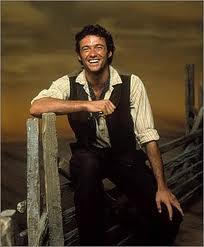But, for me, Hugh Jackman = Wolverine. I mean, I've seen him in other movies and enjoyed them. It's just that when I think Hugh Jackman, I think of him as Wolverine. Not as the magician from The Prestige. Not as a theater performer. And certainly not as a singer.
Up until a few weeks ago (yes, I've been planning on blogging about this for weeks. Life got in the way.), this is what came to mind when someone said "Hugh" and "Jackman" together:
And then I watched this theater version of Roger and Hammerstein's Oklahoma! He plays Curly.
I was floored by his performance. The man can act. It's seriously impressive how good he is when all the special effects are taken away. He brought out all the humor that's embedded in the lyrics of the songs and the situations they sing them in. You know the humor's there in the R&H original, but the guy who plays Curly in it just kind of stands there and smiles and sings. Jackman brings so much life and expression to Curly that Oklahoma! moves to a whole different level of entertainment. He can actually dance and he has this incredible voice. Here, jump a few seconds into the video and listen:
Would you expect that from the guy who's famous for playing a mutant with claws? I know I didn't. And it was so neat to discover this entirely different aspect of one of my favorite actors. It also got me thinking. Thinking about how there is so much more to people than we think and assume.
We summarize people all the time. "She's a writer." "He's an actor." We associate individuals with what we see as their primary role. And they are that person. But they're also more than that. They're a particular combination of experiences and history, virtues and vices, hopes and hurts, dreams and hidden talent. It's so easy to attribute traits to someone because those traits are normally associated with that role. And once that attribution is made, that's all we tend to perceive.
We forget how complex people are. We forget how many roles a single individual fills. We forget to wonder or care about people's pasts, even though their histories have made them who they are. We just assume they've always been the way they are, that it's just their personality to be optimistic or aggravating. We never think about the possibility that they have to fight for that optimism or that there's good reason for someone to be begging for attention.
It's so obvious, too. We all know, intellectually, that people are complicated. We all know that there's a wealth of backstory for every single person on the planet. We know that there's more to people than first impressions. And yet we continue to put people into nice, neat little categories and expect their behavior to be consistent with the status we label them with.
I think that's what made discovering Hugh Jackman's musical talent so exciting and fun. He doesn't just fit into the hot-shot-actor/famous-person box any more. Not neatly, anyway. He's now actor, stage performer, and singer. He's so much more interesting now. And I think everyone is like that.
They're more. They're more than we expect or anticipate. They're more than we assume and are capable of more than we assume.
I think, at least in part, the revelation of that more is what makes life interesting. It makes life not just a grand adventure, but an adventure of character proportions. What do you think?






